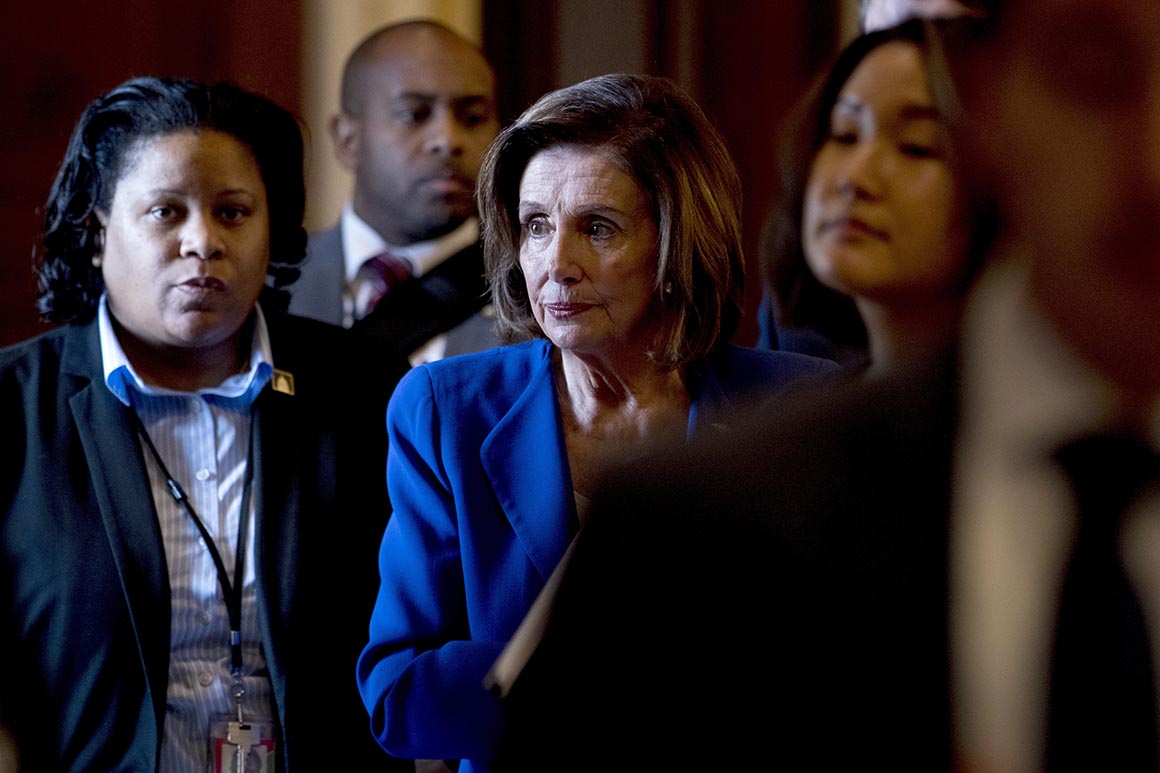
If Democrats push for more of the same in CARES 2, they shouldn’t expect different results. For example, they want to pump money into underfunded state agencies overwhelmed by unemployment claims, which makes sense on compassion and policy grounds—but that would also be a political bailout for Republican governors like Florida’s Ron DeSantis. And while Schumer’s call for a “heroes fund” to increase the pay of essential workers during the crisis is a worthy idea, it’s not hard to imagine the heroes being grateful to Trump for the extra cash.
The art of negotiation is about using your leverage to get things that your counterpart doesn’t really want to give you, and Democratic leaders don’t really seem to want to do that.
2. A Little More Than More of the Same
The Democrats did have one hardball moment during the CARES Act negotiations, when they refused to pass the bill without strings attached to the corporate bailout. Trump erupted on Twitter, accusing Pelosi of rooting for “the Virus to win,” and even non-Trump-worshipping GOP senators like Mitt Romney and Susan Collins unloaded on Democrats for delaying relief.
As markets swooned and “Democrats Block Aid” stories posted, the terror among rank-and-file Democrats was palpable, and their leaders quickly cut a bipartisan deal that they claimed would subject the bailout to serious oversight and harsh conditions to make sure it put workers first.
But Trump made it clear the day he signed the bill that he didn’t intend to honor its oversight provisions. He has already fired the special inspector general who was supposed to scrutinize his administration’s work. And it now appears that the conditions that Democrats touted—restrictions on layoffs, executive bonuses and stock buybacks by bailed-out corporations—won’t apply to most of the $500 billion in the bill for large firms.
Democrats could fix that in CARES 2. Even if they stick with their more-of-the-same strategy, and remain committed to bipartisan compromise rather than take-it-or-leave-it demands, some Democrats would like to hold out for the strings they thought their leaders had attached last month.
For example, Democrats could insist on extending their ban on the Trump family benefiting from the corporate bailout to the small business bailout, which currently includes a loophole allowing large hotel chains to apply for relief. They could use their leverage to restore some of the congressional oversight powers that Trump has undermined for three years. They could demand permanent “countercyclical stabilizers” that would automatically pump federal dollars into the economy whenever unemployment rises above a certain level, so that congressional obstructionism wouldn’t be able to thwart economic stimulus in future recessions.
Then again, Democrats could also push for more money for the Institute of Museum and Library Services, “bio-surveillance of wildlife,” and other random budget items from the bloated House draft that didn’t make it into the final bill. It would be a silly and politically risky use of their leverage—they’re already taking heat over their $25 million plus-up for the Kennedy Center, which laid off its orchestra anyway—but the point is that they have more leverage than they seem to realize, and they can use it however they want.
One possible use would be to fix the most glaring omission in the CARES Act.
3. Putting the First Thing First
Giving people money to spend will help ease the current economic disaster. Giving small businesses money to pay their employees will also help ease the current economic disaster. But experts believe there is only one way to end the current economic disaster, and while the CARES Act didn’t fund it, some Democrats are trying to make sure the next stimulus does.
The only way to revive the economy is to end the pandemic, which will require a frantic industrial and bureaucratic mobilization to ramp up coronavirus testing, tracing, tracking and quarantining. The CARES Act will pour $180 billion into the medical system, which will help treat the afflicted, but it didn’t finance the kind of all-out public health campaign that nations like South Korea and Taiwan have used to contain the virus and reopen their economies.
University of Chicago economist Austan Goolsbee, who served as President Obama’s top economic adviser, compared the current approach to keeping warm by burning money instead of fixing the furnace. He suggested that as long as Democrats are helping Trump pour taxpayer dollars into a locked-down economy, they ought to insist on financing an effort to end the lockdown.
“The first rule of virus economics is that you gotta stop the virus before you can do anything about the economics,” Goolsbee said. “If we’re spending trillions, I don’t understand why we’re not throwing hundreds of billions at the things we need to stop the spread.”
More than 800 economists from both parties have signed a letter urging Congress to focus on ending the pandemic, and Rep. Jamie Raskin (D-Md.) has crafted language to try to accelerate a South Korea-style approach to public health along with a World War II-style approach to manufacturing tests, masks and other equipment. Democrats could insist on attaching it to any coronavirus relief bill, and it’s not even clear that Republicans would object. In an interview, Raskin described the CARES Act approach as the economic equivalent of a ventilator—absolutely necessary to keep the patient alive, but totally inadequate to cure the disease.
“Any dollar we spend today on defeating the virus will save thousands of dollars in spending later,” Raskin said. “We’ll never restore the economy until we stop the spread.”
4. Protecting November
There was international outrage on Tuesday over images of Wisconsin voters risking their lives in long lines at the polls after Republicans in the state Legislature and a conservative majority on the Supreme Court foiled a Democratic governor’s efforts to postpone the election. The group Freedom House, renowned for monitoring elections in fragile democracies around the world, issued a statement calling on the United States to ensure universal vote-by-mail, online voter registration and other measures to guarantee the safety and integrity of the November election.
“This is a time for political parties everywhere to work together and compromise,” said Freedom House President Michael Abramowitz. “It is more important that we ensure voters of the validity of our elections than win an immediate partisan victory.”
But American politicians tend to view measures to expand access to the ballot through a strictly partisan lens: Democratic leaders support them while Republican leaders don’t. Trump actually warned that universal vote-by-mail could expand the electorate so dramatically that “you’d never have a Republican elected in this country again.” He voted by mail in 2018, but he suggested without evidence Tuesday that absentee voting is rife with fraud: “Mail ballots, they cheat, OK? People cheat. Mail ballots are a very dangerous thing for this country.”
Overseas military personnel can already vote by mail, as can all voters in states like Oregon, and Democrats could demand that any pandemic relief legislation extends that privilege to all voters—if not permanently, at least in November. “Making sure our elections can be conducted fully and fairly is a very high priority for us,” Schumer said Tuesday.
The question, again, is how very high a priority. In the CARES Act negotiations, Democrats pushed for $4 billion for election protections, along with guaranteed vote-by-mail and early voting; Republicans agreed to only $400 million with no guarantees. But if Democrats really wanted a vote-by-mail guarantee in November—or for that matter a guarantee that Trump can’t suppress Democratic votes by declaring selective emergencies in cities—they could refuse to pass CARES 2 without one. Republicans would accuse them of blocking aid to people in need for partisan reasons, but accusations like that never deterred Republicans in 2009.
Jeff Hauser, director of the left-leaning Revolving Door Project, said that if Democratic leaders won’t fight to make relief contingent on addressing “this very literal threat to our democracy,” liberal senators like Elizabeth Warren and Bernie Sanders should fight the Democratic leaders. “If ‘the team’ doesn’t prioritize democracy, then this is not the time to be a team player,” Hauser said.
5. Thinking Big
McConnell has repeatedly attacked Democrats for trying to exploit the pandemic to push expanded voting rights, green energy and wealth redistribution. “We’re not going to be doing, in the name of an emergency, items unrelated to the emergency,” he said last week.
Then again, it’s hard to see what the CARES Act’s $170 billion tax cut for wealthy real estate investors had to do with the emergency. But Republicans fought for it and got it, and if Democrats wanted to advance their longer-term priorities, they could fight for them and get them as well. They just have to be willing to take the risk that Republicans will walk away and let the Trump economy founder—and that the public will blame Democrats for the results. They do not seem willing to take that risk.
“We’re terrified that we’ll look like obstructionists,” one Democratic congressional aide admitted.
Even though Democrats have already worked with Republicans to send three bipartisan relief packages to Trump’s desk, most of them seem to have internalized McConnell’s dictum that pushing for a permanent expansion of sick leave or “green stimulus” that would help address the climate crisis as well as the current economic mess would constitute a partisan betrayal. Pelosi suggested as much when she withdrew her initial demand for infrastructure investments.
“While I’m very much in favor of doing some things we need to do—clean water, more broadband, the rest of that—that may have to wait for a bill beyond that right now,” she said.
Infrastructure might not be the most enticing ask for Democrats in a coronavirus bill, even if Congress moves from relief to recovery bills in May. Most infrastructure projects take time to get started, so they’re not the best short-term stimulus, especially when construction sites aren’t even safe. And Democrats might want to wait until after the election to push a mammoth infrastructure package, to make sure the Trump administration doesn’t pour the money into rural sprawl roads that could undermine their climate goals.
But Democrats certainly have the power to pursue those goals. They could insist on funding for zero-emissions geothermal drilling projects that could employ laid-off oil workers. They could insist on reviving an Obama stimulus program for solar and wind projects that helped launch renewable power in the U.S. and put thousands of installers to work. And if Republicans balked, they could insist on undoing that $170 billion real estate tax cut, or for that matter undoing the firing of that Navy captain who tried to protect his seamen from the virus. The House could pass a bill with any or all of those popular demands, then put the pressure on McConnell to send it to Trump’s desk as quickly as possible.
The thing is, Democratic leaders genuinely seem to believe all the critical things they said about Republican obstructionism under Obama. They don’t seem interested in taking political hostages or extracting a policy ransom. But Republicans understand the power of no, and the weakness of a party that isn’t really willing to say no. As long as Democrats are terrified of looking like obstructionists, Trump won’t have to worry about obstruction.
Source: politico.com
See more here: news365.stream





